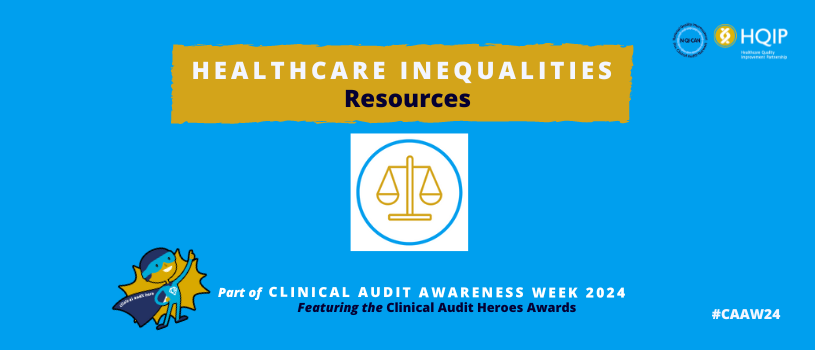
#CAAW24: Healthcare Inequalities resources published
Published: 26 Jun 2024
📢 As part of Clinical Audit Awareness Week 2024, which aims to highlight the value of clinical audit and quality improvement in enhancing patient outcomes, we are pleased to share a range of useful resources from HQIP, the clinical audit community, and the broader healthcare sector focusing on Healthcare Inequalities:
Health inequalities are known to cause unjust and preventable differences in health outcomes so it is essential that health services address the needs of these underserved communities. Accurate and reliable data is required in order to identify barriers in current practice so it is essential that ethnicity and deprivation are included in National Clinical Audit and Patient Outcomes Programme (NCAPOP) specifications. For more information on this, please see Improving Health Inequality Data in the National Clinical Audit and Patient Outcomes Programme and the accompanying infographic.
The following NCAPOP programmes have reported on healthcare inequalities:
- National Lung Cancer Audit – State of the Nation report – There was a gradient in the proportion of patients with lung cancer who came from the most deprived to the least deprived areas (1=Most: 25.8%, 3=19.9%, 5=Least: 15.1%).
- National Paediatric Diabetes Audit – Report on Care and Outcomes – Despite improvements in outcomes and use of technologies across different ethnicities and areas of deprivation, inequalities remain evident. In terms of rtCGM use, the inequality gap by deprivation has reduced however the difference in use between Black and White children with Type 1 diabetes has widened from 8.6% in 2021/22 to 14% in 2022/23.
- Fracture Liaison Service Database – Annual Report – Indices of multiple deprivation (IMD) bring together 37 separate indicators that each reflect a different aspect of deprivation experienced by individuals living in an area. IMD is used to identify those living in the most and least deprived areas. The most deprived IMD, in line with Core20PLUS5, were less likely to have a timely bone health assessment (57% vs 66%) or DXA (25% vs 33%), lower falls assessment (52% vs 60%), recommended bone therapy (48% vs 57%) and follow up at 16 weeks (38% vs 46%).
- Mothers and Babies: Reducing Risk through Audits and Confidential Enquiries across the UK – A comparison of the care of Black and White women who have experienced a stillbirth or neonatal death – Major or significant issues were found with antenatal care provision for 83% of black women compared with 69% of white women. 33% of black women and 54% of white women had major or significant care issues during postnatal and bereavement care. 67% of black mothers and babies and 46% of white mothers and babies had major or significant issues identified with respect to pathology. 75% of black parents and 66% of white parents had major or significant issues identified at follow-up or during review of their care and that of their babies.
For Clinical Audit Awareness Week 2024, HQIP is releasing a new blog on health inequalities. In Yes We Can, Professor Danny Keenan, Medical Director at HQIP, explores the importance of national clinical audit in addressing health inequalities: www.hqip.org.uk/blog.
In addition, the following resources from HQIP are also useful:
- Article: In Mind the (health) gap, Dr Josie O’Heney, 2021/22 National Medical Director’s Clinical Fellow at HQIP, discusses the role of data and quality improvement (QI) in addressing health inequalities – Cornerstone2023.pdf (article on pages 14&15).
- Case study on a 2023 Clinical Audit Awareness Week commended project from Sandwell & West Birmingham NHS Trust on an audit of homeless patients – a population which has high rates of substance and alcohol dependence, hepatitis C and multiple morbidity, compared to the general population – Health Inequalities SWB 2023 case study.
- Report: In Spotlight on the Early Years from HQIP, we aim to identify cross-cutting lessons relating to early years healthcare with a focus on health inequalities and variation in care – Spotlight on the Early Years – HQIP.
Note that this list is intended to signpost to relevant useful resources but, for those published outside of HQIP, we are unable to take responsibility for them – please contact the provider direct if you have any questions.

